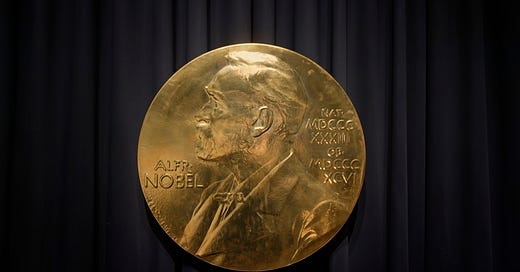Nobel Prize in Literature 2024
Han Kang of South Korea, plus an aside on the other Nobel prizes
The Nobel Prize in Literature was announced in Stockholm by the Swedish Academy on 10 Oct; it will be awarded on 10 Dec at a ceremony at the Stockholm Concert Hall (Konserthuset)
We’ll move a bit beyond the Literature Prize to discuss Nobel Prizes in general. If you focus for the next twenty years or so, you’ve got five (or six) chances to win!
The Nobel Prize has been awarded in the five categories of Physics, Chemistry, Physiology or Medicine, Literature, and Peace since 1901. A few prizes have been missed, especially in the war years and also when no suitable candidates were available, but all categories have been awarded every year since 1973. The prize originated from Alfred Nobel’s will, to be awarded “to those who, during the preceding year, have conferred the greatest benefit to humankind”. Alfred Nobel was a Swedish chemist, engineer, and industrialist, best known for the invention of dynamite, who died in 1896 at sixty-three. Since 1968, a sixth prize has been established for Economic Sciences; it isn’t strictly a Nobel Prize, but is awarded by the same process, at the same ceremony and receives the same prize money. The funding for the Economics Prize is different, coming from the Swedish central bank, and there is some criticism, including from members of the Nobel family, that this prize was not part of Nobel’s intention and shouldn’t benefit from the Nobel name.
The prize ceremonies are on 10 December, the date of Nobel’s death—in Oslo for the peace prize and in Stockholm for the rest. The winners are announced in October on successive days for each prize. Recipients are known as Nobel laureates and receive a gold medal, a diploma, and a monetary award, currently 11,000,000 krona (about £800k). A prize can be shared by up to three people, although the peace prize can also be awarded to organizations. The award was intended for achievements in the previous year, but this has shifted towards discoveries that have stood the test of time—for literature, the prize is generally awarded for a body of work rather than a single publication. Each winner is meant to hold a lecture in the days leading up to the award, the Swedish king presents the prizes at the Stockholm event, and there are luxurious banquets after the ceremonies in Stockholm and Oslo.
The Swedish Academy, a group of eighteen members chosen for life, select the Nobel literature laureate, chosen from nominations that the Nobel Committee ask a selection of experts to provide. The processes for the other prizes are similar, except the awarding bodies are different: the Royal Swedish Academy of Sciences for physics and chemistry, the Nobel Assembly at Karolinska Institute for medicine, and the Norwegian Nobel Committee for the peace prize.
France has the most literature winners with sixteen, followed by the US and the UK with thirteen each; the language most written in is English, with French and German following, then Spanish. The last UK winners were Kazuo Ishiguro in 2017, Doris Lessing in 2007 and Harold Pinter in 2005.
Results
Nobel Prize in Literature: Han Kang, a 53-year-old Seoul-based South Korean author, has won “for her intense poetic prose that confronts historical traumas and exposes the fragility of human life”. She’s written eleven novels, including the 2016 International Booker–winning The Vegetarian, about a woman who becomes a vegetarian—presented as an act of subversion in South Korea—against the wishes of her husband and father, and how her life spirals afterwards. This Guardian article, discussing the Nobel award, states her style as “Strange, in a truly Kafkaesque sense, disquieting and subversive, Han’s style is both spare and lyrical .… her subject is human violence and the possibility, or impossibility, of understanding” and says that “her work does not present a flattering picture of her country”.
Nobel Prizes in everything else: See the Nobel Prizes 2024 on the Nobel website for the winners of each prize and a brief summary of why they won it. You have machine learning, proteins, microRNA, freedom from nuclear weapons, and how institutions affect prosperity. In brief.
See Nobel Prizes in Literature from the Nobel website or Wikipedia, Nobel literature laureates for a list of all Nobel Literature laureates—the Wikipedia site has a few more details such as nationality and genre. For a list of Nobel winners in all the categories (including economics), see Nobel website, all prizes or Wikipedia, all laureates.
Coming next are the World Fantasy Awards on 20 Oct. You may realise this has already happened (The Reformatory by Tananarive Due has won best novel).




